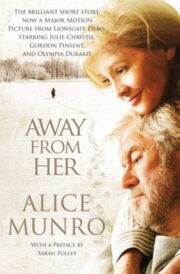She had a book open in her lap.
She said, “Look at this beautiful book I found, it’s about Iceland. You wouldn’t think they’d leave valuable books lying around in the rooms. The people staying here are not necessarily honest. And I think they’ve got the clothes mixed up. I never wear yellow.”
“Fiona…,” he said.
“You’ve been gone a long time. Are we all checked out now?”
“Fiona, I’ve brought a surprise for you. Do you remember Aubrey?”
She stared at him for a moment, as if waves of wind had come beating into her face. Into her face, into her head, pulling everything to rags.
“Names elude me,” she said harshly.
Then the look passed away as she retrieved, with an effort, some bantering grace. She set the book down carefully and stood up and lifted her arms to put them around him. Her skin or her breath gave off a faint new smell, a smell that seemed to him like that of the stems of cut flowers left too long in their water.
“I’m happy to see you,” she said, and pulled his earlobes.
“You could have just driven away,” she said. “Just driven away without a care in the world and forsook me. Forsooken me. Forsaken.”
He kept his face against her white hair, her pink scalp, her sweetly shaped skull. He said, Not a chance.
Acclaim for Alice Munro
“No one working today can write more convincingly about ‘the progress of love’ than Alice Munro.”
“Alice Munro is the living writer most likely to be read in a hundred years.… Her genius, like Chekhov’s, is quiet and particularly hard to describe, because it has the simplicity of the best naturalism, in that it seems not translated from life, but, rather, like life itself.”
“Munro’s stories are composed with a clarity and economy that make novel-writing look downright superfluous and self-indulgent.”
“[Munro’s] writing never loses its juice, never goes brittle; it also never equivocates or blinks, but simply lets observations speak for themselves.”
“Alice Munro spins tales that show us, again and again, and with wondrous grace, how much can be done in a simple short story.”
“It has been remarked that there is almost always something open-ended, unexplained, or incomplete in Munro’s work. But this deliberate refusal to weave in all the loose threads makes her stories seem more authentic, since this is what real life is like.”
“Munro is the illusionist whose trick can never be exposed. And that is because there is no smoke, there are no mirrors. Munro really does know magic: how to summon the spirits and the emotions that animate our lives.”
“In Munro’s hands, a short story is more than big enough to hold the world—and to astonish us, again and again, with the choices forced upon the human heart.”
“Nothing in a Munro story ever feels contrived…. [She] sings, and her women are heroic. They endure the lives produced by their choices and the fates, and they endure in the mind of the reader.”
“From a markedly finite number of essential components, Munro rather miraculously spins out countless permuta tions of desire and despair, attenuated hopes and cloud bursts of epiphany.”
About the Author
Alice Munro grew up in Wingham, Ontario, and attended the University of Western Ontario. She has published more than ten collections of stories as well as a novel, Lives of Girls and Women. During her distinguished career she has been the recipient of many awards and prizes, including three of Canada’s Governor General’s Literary Awards and its Giller Prize, the Rea Award for the Short Story, the Lannan Literary Award, the W. H. Smith Literary Award, and the National Book Critics Circle Award. Her stories have appeared in The New Yorker, The Atlantic Monthly, The Paris Review, and other publications, and her collections have been translated into thirteen languages. Alice Munro and her husband divide their time between Clinton, Ontario, near Lake Huron, and Comox, British Columbia.
ALSO BY ALICE MUNRO
The View From Castle Rock
Runaway
Hateship, Friendship, Courtship, Loveship, Marriage
The Love of a Good Woman
Selected Stories
Open Secrets
Friend of My Youth
The Progress of Love
The Moons of Jupiter
The Beggar Maid
Something I’ve Been Meaning To Tell You
Lives of Girls and Women
Dance of the Happy Shades
Copyright
A VINTAGE CONTEMPORARIES ORIGINAL,
MAY 2007
“The Bear Came Over the Mountain” copyright © 1999
by Alice Munro
Preface copyright © 2007 by Sarah Polley
All rights reserved.
Vintage is a registered trademark and Vintage Contemporaries and colophon are registered trademarks of Random House, Inc.
This is a work of fiction. Names, characters, places, and incidents either are the product of the author’s imagination or are used fictitiously. Any resemblance to actual persons, living or dead, events, or locales is entirely coincidental.
The Cataloging-in-Publication Data is on file at the Library of Congress
eISBN: 978-0-307-48181-8
www.vintagebooks.com
v3.0


"Away from Her" отзывы
Отзывы читателей о книге "Away from Her". Читайте комментарии и мнения людей о произведении.
Понравилась книга? Поделитесь впечатлениями - оставьте Ваш отзыв и расскажите о книге "Away from Her" друзьям в соцсетях.